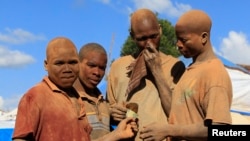KAMPALA —
A new report from Human Rights Watch said mining in Uganda’s Karamoja region could lead to human rights abuses and land disputes -- unless the Ugandan government does more to protect the interests of the region's indigenous people.
During the past several years, mining exploration has boomed in Uganda's northeastern region of Karamoja, which many believe to be rich in gold. But according to a new HRW report released Monday, local people have been given little information about companies’ plans for their land. Nor, it said, have they been given much say in the process.
HRW researcher Maria Burnett said the Ugandan government needs to do more to protect the rights of Karamoja's people. Otherwise, she said, abuses are sure to follow.
“If these systems aren’t put in place early, then it’s the inevitable way that this stuff goes, and there are a lot of examples of where mining ends up prompting human right abuses either in unlawful land evictions, or in a failure to pay royalties, and in all these other ways. There has to be a political commitment to do these development projects from the ground up,” she said.
Karamoja is one of the poorest regions of Uganda, and its people have historically been marginalized by the national government.
Simon Nangiro, head of the Karamoja Miners’ Association, says people are afraid their land will be sold out from under them. Karamoja is a dry region prone to drought, he adds, and even exploration impacts livelihoods.
“How do you fence off a place where my goats are grazing, where my cows are grazing? It’s the dry season, and you fence that place. And then the water, you remove it at that rate of 10,000 liters per hour. If we don’t receive rains soon, we shall see what it means,” he pointed out.
Royalties from mining could benefit the people of Karamoja, said Burnett, if legal frameworks are put in place to protect their rights. But until then, she adds, the budding mining industry could do more harm than good.
During the past several years, mining exploration has boomed in Uganda's northeastern region of Karamoja, which many believe to be rich in gold. But according to a new HRW report released Monday, local people have been given little information about companies’ plans for their land. Nor, it said, have they been given much say in the process.
HRW researcher Maria Burnett said the Ugandan government needs to do more to protect the rights of Karamoja's people. Otherwise, she said, abuses are sure to follow.
“If these systems aren’t put in place early, then it’s the inevitable way that this stuff goes, and there are a lot of examples of where mining ends up prompting human right abuses either in unlawful land evictions, or in a failure to pay royalties, and in all these other ways. There has to be a political commitment to do these development projects from the ground up,” she said.
Karamoja is one of the poorest regions of Uganda, and its people have historically been marginalized by the national government.
Simon Nangiro, head of the Karamoja Miners’ Association, says people are afraid their land will be sold out from under them. Karamoja is a dry region prone to drought, he adds, and even exploration impacts livelihoods.
“How do you fence off a place where my goats are grazing, where my cows are grazing? It’s the dry season, and you fence that place. And then the water, you remove it at that rate of 10,000 liters per hour. If we don’t receive rains soon, we shall see what it means,” he pointed out.
Royalties from mining could benefit the people of Karamoja, said Burnett, if legal frameworks are put in place to protect their rights. But until then, she adds, the budding mining industry could do more harm than good.




